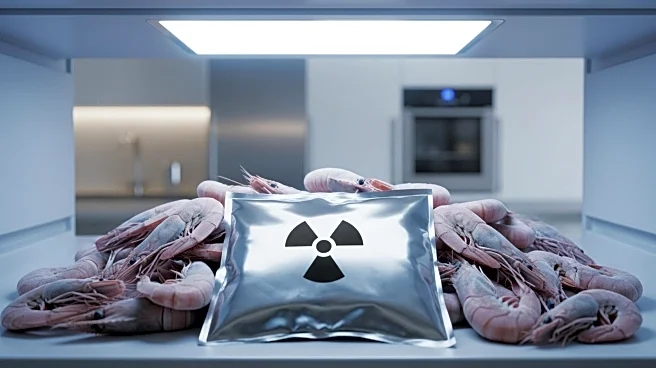What's Happening?
The U.S. Food and Drug Administration (FDA) has issued recalls for several brands of frozen shrimp due to potential contamination with the radioactive isotope Cesium-137. The affected brands include Lawrence Wholesale, Southwind Foods, and AquaStar, with products distributed across over 40 states. The recalls follow initial concerns raised by the detection of Cesium-137 in Great Value frozen shrimp sold at Walmart. Although the detected levels of Cs-137 were below federal intervention standards, officials remain concerned about prolonged exposure to radiation. The FDA has warned that the shrimp may have been packaged and prepared in unsanitary conditions, although no product has tested positive for Cs-137.
Why It's Important?
The recalls highlight significant concerns about food safety and the potential health risks associated with radioactive contamination. Prolonged exposure to radiation, even at low levels, can lead to health problems, making this issue critical for consumer safety. The widespread distribution of the affected shrimp across numerous states underscores the potential impact on public health and the seafood industry. Retailers and consumers are urged to be vigilant, as the contamination could affect consumer trust and lead to economic repercussions for the companies involved.
What's Next?
The FDA is expected to continue its investigation into the source of contamination and may issue further recalls if additional products are found to be affected. Retailers and distributors will likely face increased scrutiny and pressure to ensure food safety standards are met. Consumers are advised to check for updates and avoid purchasing or consuming the recalled shrimp products. The situation may prompt regulatory agencies to review and strengthen food safety protocols to prevent similar incidents in the future.
Beyond the Headlines
The recalls raise ethical and legal questions about food safety practices and the responsibility of companies to ensure their products are free from contamination. The incident may lead to increased consumer demand for transparency in food sourcing and production processes. Additionally, it could trigger discussions on the need for stricter regulations and oversight in the seafood industry to protect public health.











